Radiator emblems, being either a brand emblem or a small sculpture, are positioned at the very front of the vehicle in a place for all to see their distinguishing features.
The first automobiles did not need a radiator emblem since those vehicles did not possess a modern-style radiator with a closed water circuit. The systems were not included until the latter part of the 19th century going into the 20th century when the engine power was increased.
At the forefront of this development was the Mercedes 35 hp. In 1901, it was the first automobile to possess an efficient honeycomb radiator. The radiator displayed the front of the Mercedes and became the platform for the three-pointed Mercedes star, which originally decorated the radiator as a raised badge.

The sons of Gottlieb Daimler, the motoring pioneer who died in 1900, were the people who conceived the Mercedes star. The three rays of the emblem symbolized the vision of their father who dreamt of Daimler engines being used in land vehicles, aviation, and ships.
On June 24, 1909, Daimler-Motoren-Gesellschaft (DMG) applied to patent the three-pointed star design, and it was entered in the trademark register on February 9, 1911.
On November 5, 1921, an application was submitted for the three-pointed star as a radiator emblem, with it registered as a trademark on August 2, 1923.

At the time, the emblem enhanced the cooling water screw cap, altering the cap into a pedestal, producing aesthetics with function. Some of the stars were even supplied with an integrated cooling water thermometer.
Numerous car producers adopted the radiator mascot as an identifying emblem. During this era, the radiator was not hidden under the bonnet and accordingly was designed and decorated. The radiator fittings of the 1920s became works of art, displaying silver figures of cross-eyed fauns, animals, and unclothed ladies.

During the 1920s, the most striking radiator figures were designed by René Jules Lalique, a French artist who made radiator figures made out of glass.
The “33 Extras” exhibit at the Mercedes-Benz Museum displays one such radiator mascot in the form of a lady in a perfectly balanced, flowing posture as she holds a round object, possibly a ball or apple.


There are rare situations when the customer requested that Mercedes replace the star to display their own emblems. Constructed in 1932 for the exiled Kaiser Wilhelm II, the Mercedes-Benz 770 “GrandMercedes” Cabriolet F (W 07) proudly displayed the Hohenzollern coat of arms on its radiator grille. The vehicle is housed in the Mercedes-Benz Museum, specifically in the Collection Room 4: Gallery of Celebrities.

After the Second World War, aerodynamically enhanced vehicles became more and more popular. To achieve this, the front of the cars was redesigned, placing the radiator under the bonnet. To allow for the incoming cooling air, the grille was left at the front. The radiator grille of Mercedes-Benz vehicles still bore the Mercedes star. When the integrated radiator was introduced in the 1990s, the star was relocated onto the bonnet.



With Customer tastes and preferences changing with time, for the first time Mercedes-Benz offered customers of the 204 model series C-Class a choice between two vehicle fronts: a large central star in the radiator grille or to pick the classic, free-standing star prominently displayed on the bonnet. regardless of the changes, the Mercedes star is still one of the most well-known trademarks in the world.
The emblem has become a coveted collector’s item and is often stolen, making the emblem the most frequently required Mercedes-Benz spare part.

[Source: Daimler]


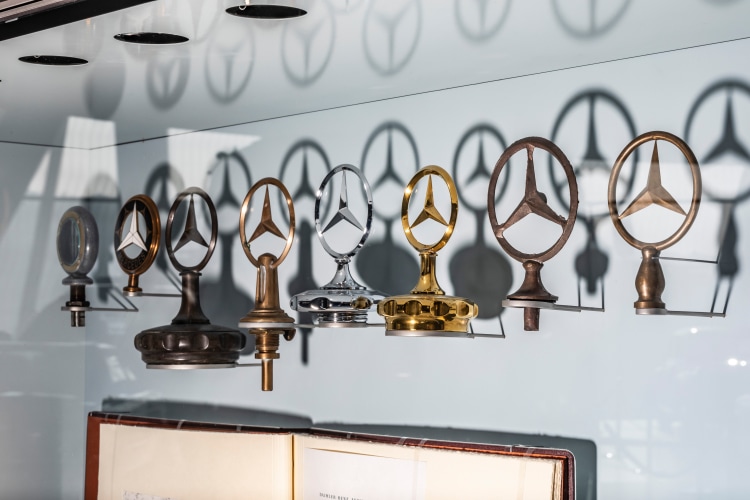

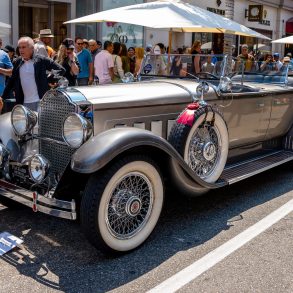
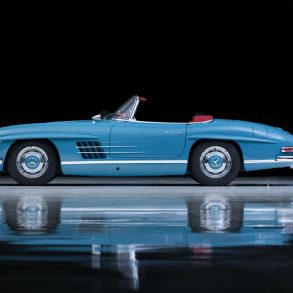
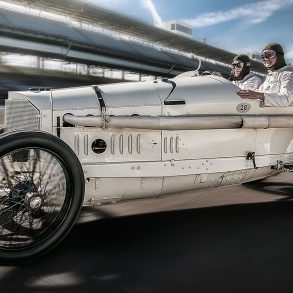
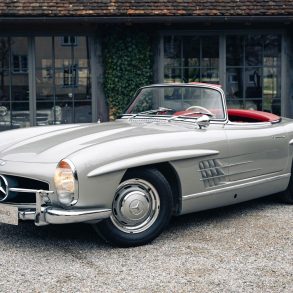
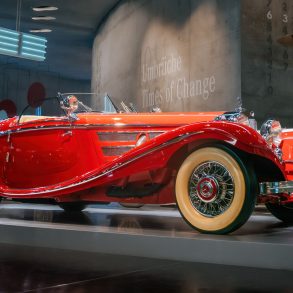
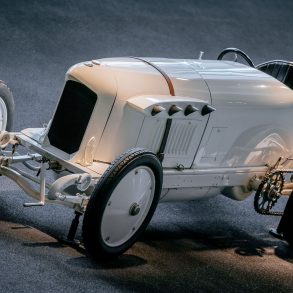

funny , I always thought it was the gun sight from the Red Barron
there is an exception collection of mascots on display at the Revs Institute in Naples Florida
Because of the stealing is why I like the medallion recessed in the hood.